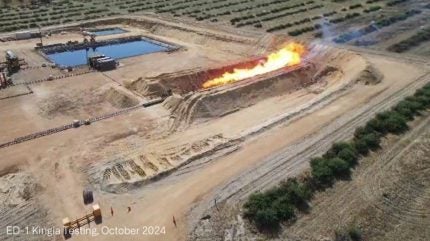
Strike Energy has reported “exceptional” outcomes from its production testing at the Erregulla Deep-1 (ED-1) onshore well in the onshore Perth basin, Australia.
The well has demonstrated strong flow rates and one of the highest flowing pressures ever recorded in the basin, marking a significant step forward for the West Erregulla project.
Following the positive testing results, ED-1 will be suspended as a future producer.
The testing equipment will be removed from the site, and the necessary engineering, documentation, costing and planning will commence to incorporate ED-1 into the Field Development Plan for the West Erregulla project, the company said.
Strike Energy added that it aims to reach an FID by the end of the year.
The ED-1 well on EP469 underwent individual flow testing of the Kingia sandstone and a commingled test with the High Cliff sandstone.
How well do you really know your competitors?
Access the most comprehensive Company Profiles on the market, powered by GlobalData. Save hours of research. Gain competitive edge.

Thank you!
Your download email will arrive shortly
Not ready to buy yet? Download a free sample
We are confident about the unique quality of our Company Profiles. However, we want you to make the most beneficial decision for your business, so we offer a free sample that you can download by submitting the below form
By GlobalDataThe Kingia interval alone produced stabilised rates of 53 million standard cubic feet per day of gas, with a flowing wellhead pressure of 5,515 pounds per square inch (psi) on a 46/64in choke.
Strike Energy noted that the wellhead pressures suggest a potential for even higher stable flow rates, with an estimated absolute open flow between 400 and 450 million cubic feet per day.
The production testing and logging at ED-1 have confirmed the presence of extremely high reservoir and flowing pressures, significant permeability, and the absence of sand and formation water production.
Additionally, the gas extracted has lower CO₂ levels and fewer impurities compared with the West Erregulla gas field, with CO₂ content recorded at 4%.
Testing rates were intentionally maintained within a conservative range to ensure the integrity of the well infrastructure and to manage the test safely, the company said in its press release.
The gas composition was consistent with downhole samples, indicating a low impurity dry gas.
However, the robust performance of the Kingia discovery during testing limited the assessment of the High Cliff zone.
The High Cliff zone experienced insufficient drawdown, reaching only some 270psi before hitting the pre-agreed testing limit. This was corroborated by a production logging tool indicating that Kingia gas flows were likely displacing High Cliff production.
The High Cliff gas discovery, with confirmed samples and permeability, will be targeted in a later phase of the well’s development, possibly including the high-potential zone in the Irwin River Coal Measures.
Erregulla Deep-1 is located adjacent and due east of the existing reserves at the West Erregulla gas field and aligns with the Lockyer and North Erregulla gas discoveries.
Strike operates the EP469 joint venture with partner Hancock, which holds an equal 50% stake.



